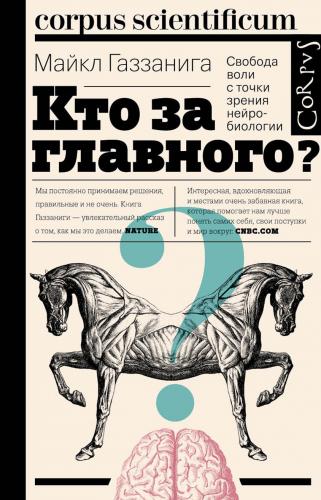48
Rilling J. K., Insel T. R. (1999) Differential expansion of neural projection systems in primate brain evolution. Neuroreport. 10 (7): 1453-1459.
49
См.: Buxhoeveden D., Casanova M. (2000) Comparative lateralisation patterns in the language area of human, chimpanzee, and rhesus monkey brains. Laterality. 5 (4): 315-330; а также Gilissen E. (2001) Structural symmetries and asymmetries in human and chimpanzee brains. In: Falk D., Gibson K. R. (eds.) Evolutionary anatomy of the primate cerebral cortex (P. 187-215). Cambridge: Cambridge University Press.
50
Vermeire B., Hamilton C. R. (1998) Inversion effect for faces in split-brain monkeys. Neuropsychologia. 36 (10): 1003-1014.
51
Halpern M. E. et al. (2005) Lateralization of the vertebrate brain: taking the side of model systems. Journal of Neuroscience. 25 (35): 10351-10357.
52
См. обзор: Hutsler J. J., Galuske R. A. W. (2003) Hemispheric asymmetries in cerebral cortical networks. Trends in Neuroscience. 26 (8): 429-435.
53
Black P., Myers R. E. (1964) Visual function of the forebrain commissures in the chimpanzee. Science. 146 (3645): 799-800.
54
Pasik P., Pasik T. (1982) Visual functions in monkeys after total removal of visual cerebral cortex. In: Neff W. D. (ed.) Contributions to sensory physiology (V. 7, P. 147–200). NY: Academic Press.
55
Rilling J. K. et al. (2008) The evolution of the arcuate fasciculus revealed with comparative DTI. Nature Neuroscience. 11 (4): 426-428.
56
Preuss T. M. (2003) What is it like to be a human? In: Gazzaniga M. S. (ed.) The cognitive neurosciences III (P. 14-15). Cambridge, MA: The MIT Press.
57
Elston G. N. (2003) Cortex, cognition and the cell: new insights into the pyramidal neuron and prefrontal function. Cerebral Cortex. 13 (11): 1124-1138.
58
Elston G. N. et al. (2006) Specializations of the granular prefrontal cortex of primates: implications for cognitive processing. The Anatomical Record. 288A (1): 26-35.
59
Williamson A. et al. (1993) Comparison between the membrane and synaptic properties of human and rodent dentate granule cells. Brain Research. 622 (1-2): 194-202.
60
Nimchinsky E. A. et al. (1995) Spindle neurons of the human anterior cingulate cortex. Journal of Comparative Neurology. 355 (1): 27-37.
61
Fajardo C. et al. (2008) Von Economo neurons are present in the dorsolateral (dysgranular) prefrontal cortex of humans. Neuroscience Letters. 435 (3): 215-218.
62
Nimchinsky E. A. et al. (1999) A neuronal morphologic type unique to humans and great apes. Proceedings of the National Academy of Sciences of the United States of America. 96 (9): 5268-5273.
63
Allman J. M. et al. (2005) Intuition and autism: a possible role for von Economo neurons. Trends in Cognitive Science. 9 (8): 367-373.
64
Hakeem A. Y. et al. (2009) Von Economo neurons in the elephant brain. The Anatomical Record. 292 (2): 242-248.
65
Hof P. R., van der Gucht E. (2007) Structure of the cerebral cortex of the humpback whale, Megaptera novaeangliae (Cetacea, Mysticeti, Balaenopteridae). The Anatomical Record. 290 (1): 1-31.
66
Butti C. et al. (2009) Total number and volume of von Economo neurons in the cerebral cortex of cetaceans. Journal of Comparative Neurology. 515 (2): 243-259.
67
Bystron I. et al. (2006) The first neurons of the human cerebral cortex. Nature Neuroscience. 9: 880-886.
68
Galton F. (1879) Psychometric experiments. Brain. 2: 149-162.
69
Caramazza A., Shelton J. R. (1998) Domain-specific knowledge systems in the brain: the animate-inanimate distinction. Journal of Cognitive Neuroscience. 10 (1): 1-34.
70
Boyer P., Barrett H. C. (2005) Domain specificity and intuitive ontology. In: Buss D. M. (ed.) The handbook of evolutionary psychology (P. 96-118). NY: Wiley.
71
Barrett H. C. (2005) Adaptations to predators and prey. In: Buss D. M. (ed.) The handbook of evolutionary psychology (P. 200223). NY: Wiley.
72
Coss R. G. et al. (1993) Development of antisnake defenses in California ground squirrels (Spermophilus beecheyi): II. Microevolutionary effects of relaxed selection from rattlesnakes. Behaviour. 124 (1-2): 137-164.
73
См: Stamm J. S., Sperry R. W. (1957) Function of corpus callosum in contralateral transfer of somesthetic discrimination in cats. Journal of Comparative Physiological Psychology. 50 (2): 138-143; а также Glickstein M., Sperry R. W. (1960) Intermanual somesthetic transfer in split-brain rhesus monkeys. Journal of Comparative Physiological Psychology. 53 (4): 322-327.
74
Akelaitis A. J. (1945) Studies on the corpus callosum: IV. Diagnostic dyspraxia in epileptics following partial and complete section of the corpus callosum. American Journal of Psychiatry. 101: 594–599.
75
См.: Gazzaniga M. S. et al. (1962) Some functional effects of sectioning the cerebral commissures in man. Proceedings of the National Academy of Sciences of the United States of America. 48 (10): 1765-1769; Gazzaniga M. S. et al. (1963) Laterality effects in somesthesis following cerebral commissurotomy in man. Neuropsychologia. 1: 209-215; Gazzaniga M. S. et al. (1965) Observations on visual perception after disconnection of the cerebral hemispheres in man. Brain. 88: 221-236; а также Gazzaniga M. S., Sperry R. W. (1967) Language after section of the cerebral commissures. Brain. 90: 131-348.
76
Van Wagenen W. P., Herren R. Y. (1940) Surgical division of commissural pathways in the corpus callosum: relation to spread of an epileptic attack. Archives of Neurology and Psychiatry. 44 (4): 740-759.
77
Akelaitis A. J. (1941) Studies o
